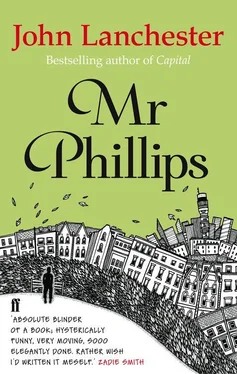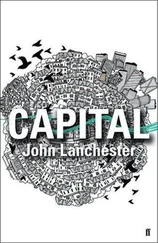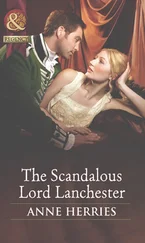It was an eventful couple of minutes. When the police told the bank robbers to throw down their guns, the robber nearest Mr Phillips slowly turned round to look at his colleagues and there had been a brief moment during which the four of them had just stood and looked at one another.
‘We’re not getting out of here without hostages,’ said the one who had seemed to be in charge. He was the first to put down his shotgun, laying it on the counter with a delicate touch — it might have been made of porcelain.
‘Would they really have taken hostages?’ Mr Phillips asks his policeman. They are still in the bank, where all the customers and staff who were caught up in the attempted robbery are now being interviewed to give their statements. Someone has made cups of sweet tea, saying that they are good for shock, and Mr Phillips has taken one. It is very sweet: the first cup of tea with sugar in it that he has drunk for thirty-plus years. He is being interviewed by two policemen, but the one taking the statement is doing all the talking while the other just sits there. The fact that they do things by handwriting strikes Mr Phillips as reassuring. Also the detective does not seem to be a particularly confident writer. He is concentrating hard as he scribbles away.
‘It’s been known,’ says the policeman. ‘It slightly depends on the career profile of the individual criminal. If he’s got previous and he’s going to go down for say ten to fifteen years anyway then he’s only adding a couple of years on the end in return for maybe getting away. That’s if he thinks he’s a chance of getting away, and these blokes could probably tell that wasn’t very likely. So no, you weren’t in much danger. At least not on that count.’
‘Somehow I hadn’t counted on the idea of being taken hostage,’ says Mr Phillips truthfully.
After the bank robbers decided not to take hostages they had all laid down their weapons and put their hands in the air, and then policemen wearing caps and bullet-proof jackets and carrying machine pistols had come into the bank, made them lie on the floor, and put handcuffs on them. Then, but not before, they said that the customers in the bank could get up. One young man, a member of staff in a short-sleeved white shirt with pens in the top pocket that had leaked while he was lying down so that it looked as if he had been shot in the breast and bled blue blood, started laughing, a tight, breaking giggle, but no one else joined in. There had been some subdued talk — ‘I thought we were for it … D’you think they would really have … Never seen anything …’ — and then more policemen, these ones without guns and flak jackets, came in and began their interviewing. There was something dignified about the handcuffed criminals as they were led away. As the robbers were being taken out of the bank, each with at least one policeman attached to each arm, one of the little old ladies said to one of them in a tone that was shrill but still conversational — the tone you might use to speak to someone you hadn’t spoken to for years but had collided with in the street, in which the basic hostility between you is still present in the clenched sound of your own voice — ‘What do you think you’re going to get out of this, then?’
For a moment it seemed as if the woman’s question was going to go unanswered, but then the last of the men — not the one who had been in charge but the other one who had been behind the counter with him — said in a quiet and unexpectedly educated voice:
‘About ten years, love.’
*
Mr Phillips finds that it is more frightening to tell over what had happened than it had actually been living through it. He thinks: I was in a bank robbery! But the policemen are reassuringly matter of fact about the whole business, until it gets to the awkward question of what he was doing there in the first place.
‘Could you confirm your place of work, sir?’ the one asking the questions asks.
‘Do I have to?’ says Mr Phillips. The effect of this remark is to make the two policemen look at each other and then look back at him without speaking.
‘I popped in to check my balance,’ Mr Phillips says.
‘At four thirty on a weekday,’ says the hitherto silent detective.
‘When your office is in the City,’ says his hitherto nice colleague, in a friendly way, as if asking for clarification.
‘Well, when I say it was my office, I mean it used to be my office.’
There is an interrogatory silence.
‘I don’t work there any more.’
‘So where do you work?’
‘I, er, I don’t,’ says Mr Phillips.
‘Don’t what?’
‘Don’t work.’
‘You don’t look like you don’t work.’ This is the nasty one again.
Mr Phillips, on the point of saying thank you, catches himself and nods instead.
‘Briefcase, suit,’ the nasty one adds.
‘Dressed for the office, I’d say,’ says the nice one.
‘Yes,’ says Mr Phillips.
‘Yes what?’
‘Yes, I’m dressed for the office.’
‘But you don’t work.’
‘No, not any more.’
‘Made redundant, were you sir?’ asks the nice one.
‘Yes.’
Both detectives sit back slightly.
‘We see a lot of it, sir. You’d be surprised.’
‘Not quite on a daily basis, I wouldn’t say that, but a lot of it all the same.’ This from the former Mr Nasty.
‘More than you’d think.’
‘It affects people in different ways.’
‘Many of its effects couldn’t be called small ones.’
‘They’re big.’
‘People do things.’
‘Silly things.’
‘Things they wouldn’t usually do.’
‘They say things too.’
‘Such things.’
‘Sir.’
‘We had one in a strangling case, didn’t we, Kevin? On Hampstead Heath. Drew a map of everybody who was present. Interviewed hundreds of people. Cross referenced, little coloured pins on the map in the situation room. Reports kept turning up this chap just sitting on a bench in a three-piece suit staring into space. There all day every day. Turned out he’d been made redundant, just like you, sir. Hadn’t told his family.’
‘Nice chap he was too, sir.’
‘Asked us not to tell his family.’
‘Which we didn’t.’
‘Been going there for three months, hadn’t he, Kevin?’
‘More.’
‘So you see, sir, it’s nothing we haven’t seen before.’
‘Nothing at all.’
‘We see everything all the time.’
‘Think of us as being proctologists,’ says the nicer of the two policemen. They share a fond smile, as at a much loved private joke.
‘Is there anything else?’ asks Mr Phillips when they have turned back to him.
The one with the notebook says, ‘Thank you very much, sir. I’ll just write this out all neat and decent, and then we’ll ask you to read and sign and then you’re free to go.’
‘Unlike the bank robbers,’ Mr Phillips says, tempted to try a joke. Neither of them reacts in any way.
Near the end of Knightsbridge Mr Phillips walks past Knightsbridge tube station, turns right and begins heading south. He wonders if he might be on the news later in the evening. Camera crews were arriving outside the bank while the police were doing their interviews. Someone holding a microphone had stepped towards Mr Phillips saying ‘Excuse me’ as he walked out, but Mr Phillips didn’t stop and they didn’t pursue him. On the other side of the bank door, a crowd of cameramen, women with clipboards, men with microphones and tape recorders, and men with notebooks was standing in a circle around Clarissa Colingford. She would certainly be in the news, and would become even more famous. Perhaps some other men would see her talking about her ordeal and fall in love with her as a result. As for Mr Phillips himself, he feels that he is over his thing about Clarissa Colingford. That was then, this is now.
Читать дальше




![Unknown - [Carly Phillips] The Bachelor (The Chandler Brothe(Bookos.org) (1)](/books/174132/unknown-carly-phillips-the-bachelor-the-chandle-thumb.webp)







